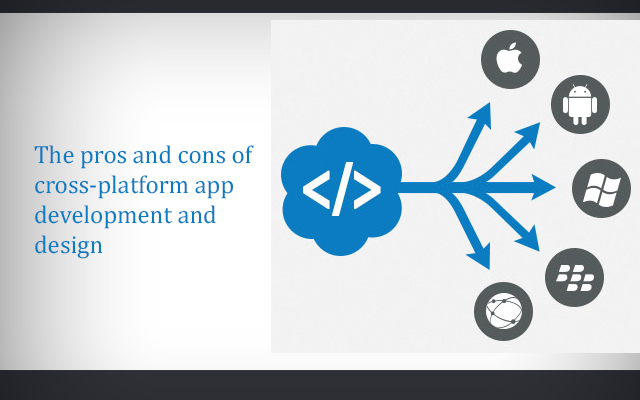The Pros and Cons of Cross-Platform App development and Design
 The popularity of a mobile application, nowadays, depends on its compatibility of with different operating systems and devices. The changing popularity and market share of mobile platforms also makes it a daunting challenge for companies to focus on the right operating systems. Therefore, a constant increase is noted in the number of companies opting for cross-platform mobile app development. An organization can always use several tools and languages to build cross-platform mobile apps. But the organizations with limited resources may find it a daunting challenge to develop applications by targeting multiple mobile platforms. So the cross-platform mobile app development of each organization must evaluate the pros and cons of this approach.
The popularity of a mobile application, nowadays, depends on its compatibility of with different operating systems and devices. The changing popularity and market share of mobile platforms also makes it a daunting challenge for companies to focus on the right operating systems. Therefore, a constant increase is noted in the number of companies opting for cross-platform mobile app development. An organization can always use several tools and languages to build cross-platform mobile apps. But the organizations with limited resources may find it a daunting challenge to develop applications by targeting multiple mobile platforms. So the cross-platform mobile app development of each organization must evaluate the pros and cons of this approach.
Pros of Cross-Platform Mobile App Development
Enhanced Code Reusability
Often developers have to write additional code for the features and functionality of the app for a particular mobile platform. But they have option to reuse the same code for different projects, and avoid writing new code for specific actions or sequences. The reusability of code allows developers to build different versions of the app rapidly for different mobile operating systems.
Access to Plugins
The widely used cross-platform mobile app development frameworks like PhoneGap and Appcelerator’s Titanium allow developers to access a wide variety of modules and plugins. The plugins make it easier for developers to integrate other tools and services to optimize the app’s performance, without writing lengthy code.
Easy to Develop and Deploy
The dynamic frameworks further allow developers to write code using scripting languages. So the web developers can write code without learning any new programming language. Also, they have option to use CSS3 and HTML5 to call native functions. The mobile apps can be further compiled and deployed quickly in a cross-platform environment. The frameworks further make it easier for developers to deploy the apps by using the innovative cloud-based tools.
Support for Cloud Services
Many reports have highlighted the growing popularity of Cloud computing among individual and business users. So the mobile applications, nowadays, need to be integrated directly with the cloud services. Along with the modules and plugins, most cross-platform mobile app development frameworks allow developers to integrate with cloud services without any hassle. At the same time, they also have option to choose from several cloud services including Box.net, AWS and Salesforce.com.
Reduced Development Cost
When an organization decides to launch different versions of the same app by targeting different mobile platforms, it has to deploy a developer or team according to the specific ecosystem. But the organization can avoid deploying multiple teams for cross-platform mobile app development. The reusability of code along with modules and plugins provided by frameworks further help organizations in curtailing the overall development time and cost.
Cons of Cross-Platform Mobile App Development
Supports Only Old Features of the Mobile Operating System
The mobile operating systems are frequently updated with new and innovative features. But the cross-platform mobile app development tools often do not support these advanced features. Often organizations have to upgrade the frameworks to avail the new features.
No Option to Use Additional Tools
The developers use customized tools to optimize the app’s functionality and performance across different mobile platforms. But most cross-platform mobile app development frameworks do not allow developers to use these tools. There are, however, certain frameworks like PhoneGap that allow programmers to use native IDE for each mobile platform. Thus, the developers can use Visual Studio for Windows Phone, XCode for iOS and Eclipse for Android.
Impact on Mobile App Design
While building a cross-platform mobile application, the developers must focus on its design. It is also advisable to decide about using a framework based on the app design. The design of an app will vary from one mobile operating system to another. If the developers do not concentrate on the UI and UX conventions, touch points, menus and navigation options, the app will look identical across multiple mobile platforms and devices. So the app design must be evaluated in detail before picking any framework or development tools.
The mobile app development strategy of an organization also needs to focus on choosing the right framework. There are several widely used cross-platform mobile app development frameworks that enable developers to build robust apps by targeting major mobile operating systems including iOS, Android, Blackberry and Windows Phone. But an organization must compare the pros and cons of each framework to effectuate its mobile app development strategy. For your mobile app development projects, you can hire developers from cross platform mobile development company in India who can help you build cross-Platform apps within allocated budgets and time schedules.
We provide cross platform mobile application development services. If you need to hire phonegap developers India, please contact us at Mindfire Solutions.